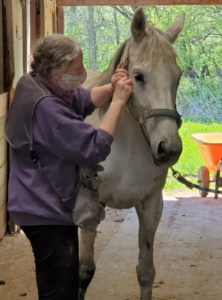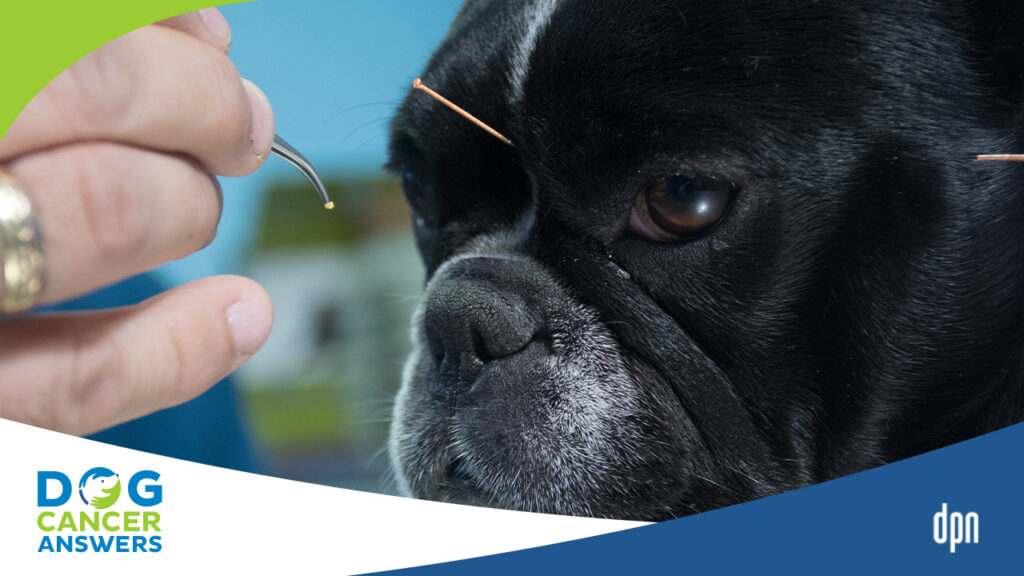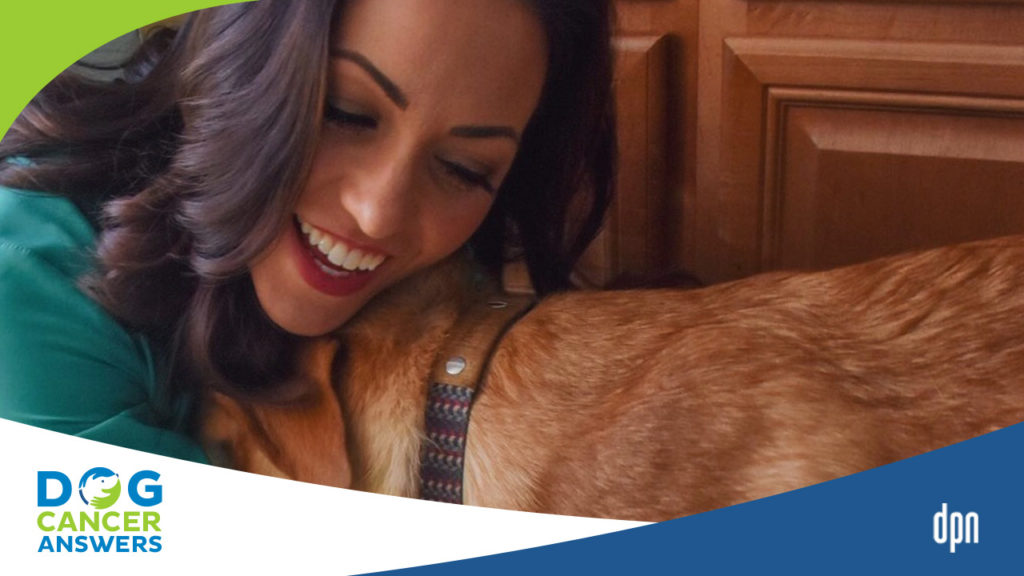EPISODE 91 | RELEASED October 12, 2020
Traditional and Classic Chinese Medicine for Dog Cancer | Dr. Cynthia Lankenau Deep Dive
An old-school veterinarian has added to her arsenal over the last forty years. Reiki, homotoxicology, acupuncture, and herbs are just a few of the tools Dr. Lankenau uses.
SHOW NOTES
An old-school vet with an exclusively holistic practice, Dr. Cynthia Lankenau rolls with the punches. She will tell you that Traditional Chinese Medicine is only the tip of an older, more impressive iceberg called Classical Chinese Medicine—and that it’s only one modality she’s used to replace conventional medicine. She has seen Nixon open China, the rise of GMO’s, the death of family farms, and the rise of regulatory boards. More importantly, she has noted how these events’ effects trickle down to our beloved pets. Even as cancer rates rise and small animals experience heightened stress levels, she remains optimistic and continues to learn voraciously. After nearly forty years of practice, she continues to add to a veterinary arsenal that already includes reiki, homotoxicology, homeopathy, acupuncture, and herbs.
Links Mentioned in Today’s Show:
Chinese Classical Medicine Links:
The Shang Han Lun, a Classical Chinese Medicine treatise on Cold Damage Diseases https://www.amazon.com/Shang-Han-Lun-Translation-Commentaries/dp/0912111577
The Wen Bing Xue, a Classical Chinese Medicine treatise on Warm Disease Theory, a summary on what Mao Zedong stripped from Classical Chinese Medicine to create the newer Traditional Chinese Medicine
https://jingherbsblog.com/ccm-vs-tcm-whats-the-difference/
Homeopathy versus Homotoxicology https://natural-med.co.za/what-is-homotoxicology/
Referrals for Other Holistic Vets
Holistic Veterinarian Medical Association.
International Veterinary Acupuncture Society https://www.ivas.org/
New York State Holistic Vets: http://nyholisticvet.com/
Classes Dr. Lankenau’s Currently Taking:
David Winston, Herbalist https://www.davidwinston.org/
Jeffrey Yuen, Daoist and Clasical Chinese Medicine Scholar https://accm.ie/jeffrey-c-yuen/
Dr. Lankenau’s Career Inspiration – Bill Moyers on Acupuncture https://billmoyers.com/content/the-mystery-of-chi/
Milk thistle, one of her favorite herbs https://veterinarypartner.vin.com/default.aspx?pid=19239&id=4952130
Her profile on the American Herbalists Guild: https://www.americanherbalistsguild.com/professional/cynthia-lankenau-dvm
Other Interviews and Appearances by Dr. Lankenau:
https://nodpa.com/n/160/Preventive-Practices-To-Maintain-Animal-Health
https://www.herbalist-alchemist.com/need-to-know/student-interviews/cynthia-lankenau/
[00:00:00] >> Dr. Cynthia Lankenau: I’m so glad I’ve done alternative medicine since early nineties now, because I don’t get frustrated. I don’t get discouraged. There’s always something else we can try. There’s always another way to look at things that we can try to control the cancers.
[00:00:19] >> Announcer: Welcome to Dog Cancer Answers, where we help you help your dog with cancer. Here’s your host, James Jacobson.
[00:00:27] >> James Jacobson: Hello everybody, and welcome to the show. Here’s a question. What’s the difference between traditional Chinese medicine and classical Chinese medicine. And how does it apply to treating dogs with dog cancer? Well, regular listeners may think of alternative and complimentary medicine as a hot new approach in veterinary care these days.
[00:00:49] But our guest on today’s show brings over 40 years of veterinary education and clinical experience to her patients. Dr. Cynthia Lankenau is a pioneer in molding Eastern and Western medicine together to help our animals. This is a fascinating conversation and I know you’ll get a lot out of it. Before we get into it, though, I’d like to quickly thank our sponsor for today’s show, the bestselling book, The Dog Cancer Survival Guide by Drs. Demian Dressler and Sue Ettinger. The Dog Cancer Survival Guide is considered the bible of dog cancer and it’s available wherever fine books are sold, or you can check it out online at DogCancerBook.com. Dr. Cynthia Lankenau thank you so much for being with us.
[00:01:34] >> Dr. Cynthia Lankenau: Well, you’re so welcome.
[00:01:36] >> James Jacobson: I am delighted to have you on our show because we’ve been talking to a lot of veterinarians over the last few months who are more or less freshly minted vets who are kind of looking at the world of veterinary medicine with alternative or what we call full spectrum perspectives.
[00:01:54] But I think it is fair to say that you are not a freshly minted veterinarinarian.
[00:01:59] >> Dr. Cynthia Lankenau: No, I’m not. I graduated from Cornell in 1981, so almost 40 years in practice.
[00:02:06] >> James Jacobson: And what’s so impressive. If I’m not mistaken, Richard Nixon, more or less, played a role in helping you decide the type of veterinary medicine you want to practice. Is that true?
[00:02:19] >> Dr. Cynthia Lankenau: Yes, he did.
[00:02:20] I’ll never forget when he opened up China and Bill Moyers had the scene of a lady getting acupuncture on a brain tumor and she was completely awake and it was due to acupuncture. And I saw that and said, I have to learn how to do that.
[00:02:38] >> James Jacobson: That’s pretty cool. So prior to that, when you were at Cornell, you had not been exposed to any of this, right?
[00:02:44] >> Dr. Cynthia Lankenau: Oh, no, not at all. Although back in my day, we were taught preventative medicine, especially in dairy cow medicine. So we had Francis Fox, is our dairy cow lecturer, and he was all about prevention. So on our exam, it would be a picture of a season. And he’d say, what diseases would you expect and what would you do?
[00:03:08] So he taught us to look at the whole picture. But that was earlier practitioners, the James Herriot day of, when you look at the whole thing and you use your intelligence and not blood work and chemical answers, you use your knowledge.
[00:03:28] >> James Jacobson: Would you describe that more as an art?
[00:03:31] >> Dr. Cynthia Lankenau: Yeah.
[00:03:31] >> James Jacobson: Or science?
[00:03:32] >> Dr. Cynthia Lankenau: It’s an art.
[00:03:33] It’s singing and feeling and knowing and understanding.
[00:03:37] >> James Jacobson: Do you think some of that art has gone away from veterinary medicine?
[00:03:40] >> Dr. Cynthia Lankenau: I’m afraid it might have. I think a lot of people are taught to practice, to prevent liability suits and they have to justify everything they do, and they have to follow established protocols. So back when I first got out of vet school, it was in a small dairy community, and a farmer would bring in a dog with a problem and 50 bucks and say fix it.
[00:04:04] And if you can’t for 50 bucks, oh, well, you tried. And it’s amazing how inventive you could be when you just are given, like, just do what you can. And we don’t see that anymore because, well, you didn’t do what Dr. X did and you didn’t follow the protocol set by this standard. And so vets are afraid of being sued and clients are not willing to accept that sometimes things don’t go the way you want them to.
[00:04:30] >> James Jacobson: Talk to me a little bit about the concept of standard of care and how that’s evolved over the years. First of all, for our listeners, what is standard of care?
[00:04:38] >> Dr. Cynthia Lankenau: Standard of care is what’s been established by the different boards. So let’s say in heartworm treatment, you have a set protocol that the heartworm society has said, this is the standard care that a dog should receive if it has heartworm. And if you vary from that standard of care, then therefore you’re not practicing up to the standard of care. So if anything goes the way you don’t quite want it to go, you are liable.
[00:05:05] >> James Jacobson: Okay. And so how has the standard of care evolved in the years that you’ve been practicing veterinary medicine?
[00:05:11] >> Dr. Cynthia Lankenau: Well, when I first got out of vet school, there was no such thing. You know, you flew by the seat of your pants and it’s finished.
[00:05:17] >> James Jacobson: Here’s 50 bucks. Fix my cow.
[00:05:19] >> Dr. Cynthia Lankenau: Exactly. And now there’s so many board certifications and so many board certified veterinarians in every area that things have to be practiced up to their standard, which you know, it’s good and it’s bad.
[00:05:32] So, yeah, there’s a higher quality maybe, but then it limits. It limits the average practitioner to become inventive.
[00:05:40] >> James Jacobson: One of the things that I hear a lot is, oh my God, all of these tests that the vet wants to run before they can even do anything are costing me thousands of dollars. What are your thoughts about that?
[00:05:53] >> Dr. Cynthia Lankenau: Well, it’s a double-edged sword. The test can give you a lot of information, but sometimes it depends on the practitioner, you know, when you know acupuncture. So I do acupuncture, homeopathics, herbal medicine with Chinese diagnostic techniques, just by looking at the tongue, taking the pulse, you immediately know what organs are stagnant.
[00:06:15] What organs are deficient. And then when you needle these different points, it gives you feedback immediately. Oh, I was right on that. There really is a weakness in the liver. There really is stagnation in the spleen because if the pulse changes the way you don’t want it to happen, you know you’re wrong. So you don’t need to rely on blood work as much.
[00:06:36] You can figure it out immediately when you’re working on the animal. And when you’re palpating some of these diagnostic points, you know, right away where the problem is, you might not know the degree, but yet I’ve seen dogs with incredibly horrible blood work come back to normal with alternative care.
[00:06:56] But on the opposite side, the blood work, if it’s horrible, it gives owners maybe a sense of reality, but hopefully not giving up on hope. So the diagnostic tests, sometimes they’re good, especially basic blood work. And let’s say if it’s an older animal and you’d never go through surgery anyways, why are you doing the test if it’s not going to change what you’re going to do with your animal? So I think sometimes there’s gotta be some common sense from in, but then the veterinarian doing the testing is trying to justify their decisions. So they’re trying to justify their recommendations, but then the owners pocketing it. So, you know, there really isn’t a simple answer.
[00:07:40] >> James Jacobson: Can we just go back to the day where like here’s 50 bucks and look at my dog?
[00:07:45] >> Dr. Cynthia Lankenau: Yeah, the perfect setting would be, right now, all individual practices have to have their own blood work, their own x-ray machine, their own CAT scan, their own everything. So the quants of the client go sky high. The idea would be, is people could share.
[00:08:01] And if there was one place where the blood work could be done so that everyone didn’t have to have their blood machines, and one place could do all the x-ray machines so that the individual practices didn’t have to have such a huge overhead. And so that you could go into that practice and have conventional care if you want to, but then have that alternative available for people and truly an alternative practitioner so that herbal medicine is not shunned, that people know that there’s options. So more cooperation would be the biggest thing.
[00:08:34] >> James Jacobson: I remember reading, I think it may have been an American Veterinary Medical Association brochure years ago, that the genesis of veterinary medicine and the whole association was that veterinarians effectively started out as horse mechanics. Have you heard that?
[00:08:50] >> Dr. Cynthia Lankenau: Yeah, well, yeah, we were because all the armies needed their horses. So we were the auto mechanics to keep the armies going, but then when we started having cities and then you had a population dependent on farmers. The farmers had to make sure that the cows could produce, it wasn’t just for their own use. And so then vets shifted from horse mechanics to farm animals, which before they never really treated them. You know, if they were sick, the owners just slaughtered them for self consumption. And then we had the pet animal industry start up. So, yeah, back at the time when draft horses were made extinct by tractors. There were tons of vet schools that went out of business. Harvard used to have a vet school. There were like half the vet schools closed down because they didn’t need horse vets anymore.
[00:09:39] >> James Jacobson: Well, that was well past the time when you started practicing, but I’m intrigued with the fact that you are, I guess you got a mixed animal practice. So you have both large animals and companion animals.
[00:09:51] >> Dr. Cynthia Lankenau: Well, it gives a better flavor. So, you know, I started out in a hundred percent just about dairy practice. I grew up on a dairy farm and you’re not a real vet, unless you treat cows, you know, that’s what I was brought up, but family farms died. So that was the love. But anyway, so then I got into alternative medicine and first I was working mostly on race horses.
[00:10:14] And then I’d be at a horse place and the owners would have their old dog with cancer and say, can you look at them? And at the time I hardly did any small animal work, but my whole practice is morphed into half small animals, mostly dogs and cats, but there’s the ferret and the, you know, some birds and some Guinea pigs.
[00:10:35] So it’s mostly horses. A few pigs. A few goats. A few alpacas. One camel. One ostrich.
[00:10:45] >> James Jacobson: Noah’s Ark.
[00:10:46] >> Dr. Cynthia Lankenau: Yeah, but it, it brings a flavor because things you do for small animals, like small animals have a lot of diabetes and metabolic stuff, now we’re seeing that in horses. So by treating small animals, it gives me a lot of unique ways of looking at the horse issues.
[00:11:02] Some of the horse diseases, all of a sudden we’re seeing now in some of our small animals. So it’s a wonderful way to just think bigger.
[00:11:10] >> James Jacobson: Let’s talk specifically about cancer. How have you noticed that changing over the years that you’ve been practicing?
[00:11:17] >> Dr. Cynthia Lankenau: Oh, it’s horrible. We’d see much younger animals, much more aggressive, different kinds. I mean, it never used to be that you’d see cancer in an animal under 10 years old. Now very commonly two three-year-old dogs will have cancer. And the explosion of lymphosarcoma in Golden Retrievers is horrible. It’s horrible. Bone cancer in the giant breeds, in the blood or in the Wolfhounds and Scottish Deerhounds is pathetic.
[00:11:47] You see these wonderful animals just devastated at young young ages. And it’s harder. When I first started doing alternative medicine, they were pretty easy to control, but I think they’re just getting more and more difficult. And I’m so glad I’ve done alternative medicines since the early nineties now, because I don’t get frustrated.
[00:12:06] I don’t get discouraged. There’s always something else we can try. There’s always another way to look at things that we can try to control the cancers.
[00:12:14] >> James Jacobson: Any conjecture as to why you’ve seen such growth in cancer? Pun, not intended.
[00:12:21] >> Dr. Cynthia Lankenau: I think the glyco phosphates and the GMO’s are a huge factor. Once we started seeing GMO corn added in the food, things got exponentially worse.
[00:12:32] So the microbiome is destroyed and it’s taken us a while to cotton on to how important the microbiome is. And then to reestablish it because glyco phosphates are in just about everything. You know, you think you have organic food, but there’s glyco phosphates. I think they did a survey and it’s in the soil, it’s in everything.
[00:12:50] So I think that’s a huge factor. I think the insistence on more vaccines are a huge factor. A lot of dogs used to get by with just a rabies shot occasionally, but now to be kenneled, to go to training classes and puppy school, everybody has to have everything. And I think the early push on early spay and neuters has a big negative effect. I think removing those reproductive hormones at an young age definitely has a negative effect. On the plus side though, our small animal people are getting so much more smart. That’s horrible English. They’re very clever. They investigate. They’re amazing people. And it used to be just to get somebody to not feed dad’s dog food was horrible. And now people are willing to home cook. They’re so proactive now.
[00:13:41] >> James Jacobson: So you practice a variety of different Eastern modalities. Actually, let me get into the question. Eastern. Do you consider what you do Eastern?
[00:13:49] >> Dr. Cynthia Lankenau: I do. I was trained in traditional Chinese medicine. That was my first certification.
[00:13:55] Well, in acupuncture, but then from traditional Chinese medicine, trying to learn classical Chinese medicine. Which there’s a big difference.
[00:14:05] >> James Jacobson: I’m familiar with TCM, but what is CCM, classical Chinese medicine?
[00:14:09] >> Dr. Cynthia Lankenau: Well, traditional Chinese medicine is the integration of all the classical philosophies. So you have the school of attacking and purging.
[00:14:17] You have the Shan Han Lung, which is the treatise on cold invasion. You have the Wen Bing theories, which is our invasion of heat pathogens. You have the treatise on stomach and spleen. You have the theory of fire spirit. So all these different schools, which basically were different ideologies. So, you know, the story that when, during Chiang Kai-Shek’s regime, acupuncture was outlawed because he wanted to modernize China.
[00:14:44] So all the acupunturists headed for the hills and there were the barefoot doctors. So Mao Zedong’s army was dying of malaria and he told the barefoot doctors, you cure my army, I’ll reinstate that you can practice acupuncture, which he won. He was good to his word, but had everything had to follow communist party ideology.
[00:15:06] So they took all of these theories of classical Chinese medicine and they modernized them and that’s traditional Chinese medicine. So all of these philosophies were just sorta like mixed all together. So the specific strategies of all those philosophies were sort of lost. The cold invaded pathogen. Well, that explains COVID or warm disease pathogens can explain auto immune disease. Retain heat pathogens then the body has to bubble wrap with fluids. Doesn’t that sound like cancer to you?
[00:15:40] >> James Jacobson: That is fascinating. I want to get into this in a minute, but I would be remissed ’cause you said something that made my ears perk up. You said one of those philosophies helps to explain COVID or you have to elaborate because our listeners are going to go, what?
[00:15:52] >> Dr. Cynthia Lankenau: So in the cold invasion theory, the body’s divided into six layers. And if your body is strong, when it invades the first layer, that’s the average person that gets cold, but, and you might feel a little sniffly or a little achy for a day, but your immune system, your Wei Chi’s able to repel it and no big deal.
[00:16:12] But if you’re weaker, if you’re deficient, it can immediately invade into these deeper layers. One of which is the Tai Yang which it can invade into the lung and spleen. So the lung is affected. You fill up with fluid. Well, Hmm. Those are the people that get hospitalized for COVID. So back in the turn of the millennium, the author of this Shang Han Lung, the treatise on cold treatise could say, you have to use these formulas to expel that pathogen, gets the fluid metabolism back up to normal to be cured.
[00:16:49] >> James Jacobson: That was a very big diversion from what we normally talk about. But I think fascinating. And it goes back to the question of the different modalities, traditional Chinese medicine, classical Chinese medicine, herbalism, which are your favorites for cancer?
[00:17:03] >> Dr. Cynthia Lankenau: So I use acupuncture to try to control the cancer.
[00:17:08] >> James Jacobson: Control, meaning control the metastasis?
[00:17:11] >> Dr. Cynthia Lankenau: Well, yeah, control the metastasis and try to focus the body to control the tumor itself, to get it under control. That’s the lung and large intestine meridian can control liver. So if you have a liver tumor, you can stimulate large intestine points to control a liver tumor because when you have cancer, the body is really it’s put out the flags, you know, it’s basically given up. It’s telling the disease process, okay. You can have my leg. I don’t care. You can have my liver, you know, that’s okay. And so the idea is you can’t over ask them with acupuncture. If you ask too much of the body, the body’s like, I can’t do all this.
[00:17:53] So you have to be very specific with your acupuncture points. What you’re asking the body to do. So I only use maybe three to five points in acupuncture and some of my teachers would be yelling at me saying we only need one, but I need a couple of more. So I use acupuncture for that. I really rely on my herbs to support the physiology of the body. And I normally don’t start with classical Chinese or classical homeopathics unless we have a never well since. So if you have an animal that was never well since vaccination or never well since they were sprayed with Febreze, you can hop on that immediately to remove that obstacle.
[00:18:38] >> James Jacobson: Of course, that makes sense. And we’re very interested to hear more about that and your other modalities, but for now, let’s take a quick short break.
[00:18:46] You know, Dr. Cynthia Lankenau is not the only vet who believes that if a technique works, we deserve to hear more about it. Our dogs don’t care where treatments come from, they just want to feel better. And that is why doctors Demian Dressler and Sue Ettinger wrote The Dog Cancer Survival Guide. It’s a guide book that shares everything you need to know about dog cancer from conventional treatments to alternative medicine to diet and lifestyle changes. The Dog Cancer Survival Guide is available everywhere fine books are sold, in paperback and an e-book conditions. And if you’d like to help support this podcast, go to DogCancerBook.com and you can get a discount by buying it direct from the publisher. The e-book is available for under $10. If you get the paperback edition, which I recommend and have highlighted throughout, you can enjoy free shipping anywhere in the United States. By using the Dog Cancer Answers coupon code, you can support us while getting the book directly from the publisher. Here’s how to save 10%. Use the promo code PODCAST. When you check out on the website, DogCancerBook.com, save 10%. Helps support this podcast and see why tens of thousands of dog lovers all over the world have come to depend on this important book. Again, the promo code PODCAST. Save 10% at DogCancerBook.com.
[00:20:17] And we’re back to hear more about modalities from continents outside of Asia. Dr. Lankenau, can you tell us a little bit about why and when you turn to Western practices.
[00:20:28] >> Dr. Cynthia Lankenau: We know most cancers are coming from the fact that the body’s liver hasn’t been able to metabolize fat or the kidney hasn’t been able to handle some of the electrically charged toxins. You have to improve the organs’ philos-, or physiology. So I use a lot of Western herbs for that. That old Milk Thistle is an incredible herb that also helps prevent metastasis. Some of our mushrooms. So I rely a lot on my herbs to improve the physiology. And then so I was switching to German medicine, Usually I’ll start with homotoxicology.
[00:21:04] >> James Jacobson: Okay. So again, there’s a bit to unpack there. The homotoxicology, which you’re saying is German, what is it doing and how is it different than homeopathy?
[00:21:14] >> Dr. Cynthia Lankenau: They’re combination remedies. So in Europe they’re often called a drainage therapy. So back after World War 2, the person that developed homotoxicology found that the German people were so shell-shocked, literally and figuratively, that classical remedies weren’t working.
[00:21:31] These people were too debilitated, too destroyed. And so he developed a system of combining homeopathic medicines in a strategy. So it’s not just throwing a whole slew of remedies together. He had a strategy to improve the function, like following down a path to improve the function of an organ or improve the function of the lymphatics or improve the function of the kidney in this organized system of combination homeopathics.
[00:22:03] Which classical homeopaths get very upset, but it’s not homeopathy. It’s not trying to give the body as similar and trying to elicit an immune reaction from a similar like disease. It’s trying to support the mitochondria and to support the expulsion of toxins from within the intracellular space, then the organs can work better and then the organs can help control the cancer.
[00:22:31] And then when the animal’s strong enough, then I go in with my classical homeopathic remedies. And with those, sometimes you can see huge jumps in the animals’ state of being.
[00:22:44] >> James Jacobson: So I am struck by the fact that you, first of all have what it sounds to me like a very deep knowledge and understanding of all these different competing or complimentary schools of medicine. And that wisdom, I guess, has to come a function of the number of years that you’ve been practicing.
[00:23:00] >> Dr. Cynthia Lankenau: Yes. And the number of classes I’ve taken. You know, once I dove in the, so it was in 91 when I took my acupuncture certification and this whole new world opened up. I had never even heard of homeopathy when I was in vet school. We were taught that herbs were poisons. You know, it was so foreign, but it was like, this world just opened up and I was in a great due to a change over in this practice I worked on, I kinda was on my own and with a non-compete from a conventional practice and the existing partners of the practice didn’t want me to use acupuncture on their time because I wasn’t charging enough money.
[00:23:40] So they let me set up my own acupuncture practice when I was still working for them. And it got so busy that I was exhausted, so I left the practice. And as long as I just used alternative medicine, I could stay right where I was. There was no non-compete for alternative medicine, but then, so I had clients that liked me because I was a vet and I kind of hated to refer them back to the regular practice, to use drugs when, so I was like, okay, well let me learn herbs and let me use homeopathics and let me learn chiropractic and let me learn everything I can so I don’t have to refer you back to conventional medicine. So there was this exponential course taking that I took to get every quiver that I could get so I never had to rely on conventional medicine.
[00:24:27] >> James Jacobson: Okay. So this goes back to where I was going with the question was our listeners have a dog that has cancer and they probably get it diagnosed by their general practice vet, and then they’re like, what do I do? Well, where can they find a veterinarian like you? ‘Cause you practice in a very discrete area. How do you go about finding someone with your knowledge base?
[00:24:50] >> Dr. Cynthia Lankenau: Well, there’s the International Veterinary and Acupuncture Society. They can Google veterinary and acupuncture. And two things would come up the Chi Institute and IVAS, and they have members.
[00:25:03] So you can look for the local veterinarians in your area. We have our little New York State Holistic Vets, so you can go on our website and we have all the vets that are in our organization and what our training is. And the percentage of what you do of alternative medicine, because there’s a lot of vets that will take an acupuncture class, but their practice is still 99% conventional.
[00:25:27] So it gives them a feel for what they do. And then there’s a Holistic Veterinarian Medical Association. They have a referral site. Veterinary and Botanical Association has a referral site. So they go to the veterinarian alternative organizations and all of them have the member listings. So they can source out people that way.
[00:25:46] >> James Jacobson: Okay. Well, we’ll definitely post the links to all of those organizations in the show notes for today’s episode, but I know a lot of vets take a very short class in one of these modalities and then say that they practice it. What are your thoughts?
[00:26:01] >> Dr. Cynthia Lankenau: So there’s some really wonderful practitioners in my area that have just taken an acupuncture class and they’re open to it.
[00:26:10] But then it’s kind of sad because they’re sort of locked in their conventional practice. And I was lucky because I was kind of kicked out of the conventional world. And so I had to rely on alternative stuff and, you know, if I could have still used steroids and antibiotics in my early days, I probably would have, because you wanted the animal to feel relief.
[00:26:31] And without knowing herbs and homeopathics, I probably would have pulled out of my pocket of things, steroids, because it’s the only thing I knew. And that’s what happens in a lot of the vets that have only taken a quick class. They fall back to their old training because that’s what they know.
[00:26:47] >> James Jacobson: What are you looking forward to learning next?
[00:26:50] >> Dr. Cynthia Lankenau: Well right now, I’m taking another advanced class with David Winston. He’s a human herbalist. He’s uh, probably one of the top human herbalists in the country. Well, probably in the world. And as often as I can I take classes with Jeffrey Yuen, who’s a Daoist priest who is unbelievable. So that’s what I learned. Learning more and more classical Chinese medicine and fine tuning my acupuncture.
[00:27:18] >> James Jacobson: I read somewhere that you will never say it’s time to put a dog down.
[00:27:23] >> Dr. Cynthia Lankenau: That’s the owner’s decision. That’s a personal bond between the owner and their animal. And my job is to support the animals as well as I can. And when the owners ask me what I would do, I sometimes say what I will, but I’ll usually say, that it’s not my decision.
[00:27:40] It’s not my judgment. It’s up to you and your pet and that’s your bond. And usually the animals will tell the owner, but then you have a lab, and a lab will stay well past when they should have been released, but they won’t leave their owner. They won’t leave them. They’re so dedicated. And some owners, even though they say they want them to go, need that animal so much that they won’t let them go, but that’s their lesson. You know, that’s not my place to say you have to say goodbye to your pet. And it’s hard, but that’s one of their lessons in life.
[00:28:14] >> James Jacobson: Have you ever had that with one of your animals?
[00:28:17] >> Dr. Cynthia Lankenau: I’ve been very lucky. My animals when it’s been their time to go they’ve left.
[00:28:20] My best teachers in my life is this old horse I had. And that horse was my most amazing teacher in my life. Unbelievable. Anyway, when he passed, I felt his soul leave and, um, it was the most beautiful experience. It was pure love, but not love like, ah, thank God I’m out of that old body. It was this overwhelming sense of love. Beyond love, you know, love more than like a divine. I’m, I can’t explain it. It was the most powerful feeling I’ve ever felt because the soul and their bodies is unlimited and without definition, and it’s always there and you just have to love them because they are just pure love.
[00:29:08] >> James Jacobson: Dr. Cynthia, you’re pure love. Thank you so much for being with us today.
[00:29:12] >> Dr. Cynthia Lankenau: Great. Thank you so much..
[00:29:14] >> James Jacobson: I enjoyed that conversation with Dr. Cynthia Lankenau. Her knowledge impresses me, but what really struck me even more is her wisdom. That decision to take a career roadblock and turn it into an opportunity has benefited countless animals in her practice. A noncompete limited her ability to practice conventional medicine, but she simply pursued everything else. From homotoxicology to classical Chinese medicine, to Reiki. She hasn’t just lived through interesting events or learned fun facts. She’s channeled them into a truly unique practice.
[00:29:57] Those touchstones. I hear them. They’re here to remind me that veterinarians are on call on our listening line to help you. If you have a question for a dog cancer vet, please call our listener line and tell us about it. We’ll send it to one of our veterinary experts. After that your question and the answer will up here on a future episode of Dog Cancer Answers.
[00:30:20] Here’s the phone number to do it. (808) 868-3200. It is a recorded line. You can call 24 hours a day, seven days a week. Call our listener line at (808) 868-3200.
[00:30:38] We’d like to once again, thank The Dog Cancer Survival Guide book by Demian Dressler and Sue Ettinger, they are the sponsors for today’s show. The book is available both online and in brick and mortar stores. And remember, if you get the book direct from us and you can help support this podcast and you can save 10%, if you use the checkout code PODCAST, and the website, DogCancerBook.com.
[00:31:06] Finally again, I’d like to thank Dr. Cynthia Lankenau, our heartfelt thanks go out to her. Until next time. I’m James Jacobson, from all of us here at Dog Cancer Answers and Dog Podcast Network, I wish you and your dog, a warm, Aloha.
[00:31:25] >> Announcer: Thank you for listening to Dog Cancer Answers. If you’d like to connect, please visit our website at DogCancerAnswers.com or call our listener line at (808) 868-3200. And here’s a friendly reminder that you probably already know. This podcast is provided for informational and educational purposes only. It’s not meant to take the place of the advice you receive from your dog’s veterinarian.
[00:31:48] Only veterinarians who examine your dog can give you veterinary advice or diagnose your dog’s medical condition. Your reliance on the information you hear on this podcast is solely at your own risk. If your dog has a specific health problem, contact your veterinarian. Also, please keep in mind that veterinary information can change rapidly, therefore, some information may be out of date. Dog Cancer Answers is a presentation of Maui Media in association with Dog Podcast Network.
Hosted By
SUBSCRIBE ON YOUR FAVORITE PLATFORM
Topics
Editor's Picks
CATEGORY








